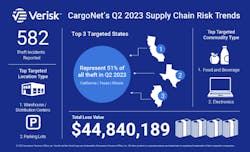Cargo theft trends came out of 2022 with severe momentum. That trend has continued with elevated numbers for the second quarter of 2023, causing industry stakeholders to caution carriers and offer information on how to protect freight.
"Cargo theft is at a 10-year high right now," Scott Cornell, transportation lead and crime and theft specialist at Travelers, told FleetOwner. "January was up 61% year over year, February was up 49% year over year, and March was up 82% year over year."
Cargo theft security network CargoNet recorded 582 thefts across the U.S. and Canada in the second quarter of 2023, a 57% increase compared to the second quarter of 2022. These shipments were valued at over $44 million altogether. Notably, the average shipment value per theft increased nearly $100,000 to $260,703 as thieves focused increasingly on high-value shipments.
See also: For sophisticated cargo thieves, use advanced tools
"If you separate out the strategic theft category," Cornell said, "from November to March… that's up over 600%."
The explosion in strategic theft is largely due to thieves taking advantage of the same tools that have made doing business in the supply chain easier for everyone else—load boards and the internet, Cornell said. This appeals to criminals who get to be at arm's length from putting themselves at risk of being caught instead of having to be on-site at a warehouse or distribution center.
The rise of strategic theft has also meant that danger is no longer as heavily concentrated in major freight hubs. Traditionally theft has been in concentrated places such as ports in Southern California and Florida—areas which Cornell called "as hot as ever"—but with strategic theft, "you can basically be anywhere and steal something anywhere," Cornell said. For example, certain counties—Maricopa County, Arizona, DeKalb County, Georgia, and Travis and Chambers counties in Texas—have recorded major upticks.
Trucking industry acts to prevent strategic cargo theft
With the threat of crime at a high, industry stakeholders have begun to offer more and more support to carriers looking for information on how to protect themselves. Load board operator Truckstop has taken it upon itself to inform customers of best practices by launching Fraud Prevention Friday, a weekly educational series focused on preventing fraud.
Every week Truckstop interviews experts to review the latest trends in cargo security, including what to be wary of when defending against fraud. This includes rates that seem too good to be true, scammers requesting pay through 3rd-party apps such as Venmo or Cash App, or brokers who use email services such as Gmail or Hotmail instead of having their own domain name.
In light of increased theft risk, freight network operator DAT Freight and Analytics has also launched new initiatives to reduce the risk of fraud and double brokering. This includes a microsite containing information and resources on fighting fraud. Additionally, the network now requires multi-factor authentication for logins.
Additionally, Northland Insurance, a subsidiary of Travelers Companies focused on commercial trucks, now allows users to use the Trucker Path mobile app to report theft directly to the Northland claim team, as well as Travelers' Special Investigation Group (SIG), which has assisted in the recovery of more than $90 million in stolen cargo since 2011, according to a Northland release emailed to FleetOwner. The company also stated that "the first 24 hours of theft are critical" to recovering cargo, and the app "dramatically decreases the time it takes to alert all appropriate parties of the loss."
Due to increased awareness and improved industry cooperation, "I think the industry is responding very well," Cornell said. He noted that the Transported Asset Protection Association (TAPA), where he serves as vice chair, is seeing booming membership. He also said he's seeing an uptick in activity by federal law enforcement to address theft.
Cornell did, at last, implore those working in transportation: "You must have a plan. You cannot do business right now in the supply chain with the amount of stuff that's going on and the type of theft that's going on and not have a plan. You have to have a plan that includes prevention," he said. "If you have a theft at two o'clock in the morning in Nebraska ... you have to know who to call."






